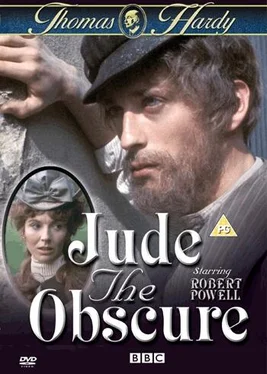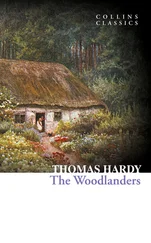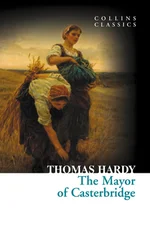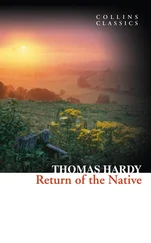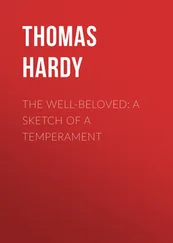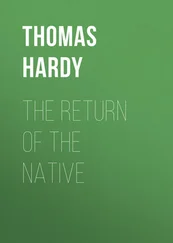She told him about the school as it was at that date, and the rough living, and the mixed character of her fellow-students, gathered together from all parts of the diocese, and how she had to get up and work by gas-light in the early morning, with all the bitterness of a young person to whom restraint was new. To all this he listened; but it was not what he wanted especially to know—her relations with Phillotson. That was what she did not tell. When they had sat and eaten, Jude impulsively placed his hand upon hers; she looked up and smiled, and took his quite freely into her own little soft one, dividing his fingers and coolly examining them, as if they were the fingers of a glove she was purchasing.
"Your hands are rather rough, Jude, aren't they?" she said.
"Yes. So would yours be if they held a mallet and chisel all day."
"I don't dislike it, you know. I think it is noble to see a man's hands subdued to what he works in… Well, I'm rather glad I came to this training-school, after all. See how independent I shall be after the two years' training! I shall pass pretty high, I expect, and Mr. Phillotson will use his influence to get me a big school."
She had touched the subject at last. "I had a suspicion, a fear," said Jude, "that he—cared about you rather warmly, and perhaps wanted to marry you."
"Now don't be such a silly boy!"
"He has said something about it, I expect."
"If he had, what would it matter? An old man like him!"
"Oh, come, Sue; he's not so very old. And I know what I saw him doing—"
"Not kissing me—that I'm certain!"
"No. But putting his arm round your waist."
"Ah—I remember. But I didn't know he was going to."
"You are wriggling out if it, Sue, and it isn't quite kind!"
Her ever-sensitive lip began to quiver, and her eye to blink, at something this reproof was deciding her to say.
"I know you'll be angry if I tell you everything, and that's why I don't want to!"
"Very well, then, dear," he said soothingly. "I have no real right to ask you, and I don't wish to know."
"I shall tell you!" said she, with the perverseness that was part of her. "This is what I have done: I have promised—I have promised—that I will marry him when I come out of the training-school two years hence, and have got my certificate; his plan being that we shall then take a large double school in a great town—he the boys' and I the girls'—as married school-teachers often do, and make a good income between us."
"Oh, Sue! … But of course it is right—you couldn't have done better!"
He glanced at her and their eyes met, the reproach in his own belying his words. Then he drew his hand quite away from hers, and turned his face in estrangement from her to the window. Sue regarded him passively without moving.
"I knew you would be angry!" she said with an air of no emotion whatever. "Very well—I am wrong, I suppose! I ought not to have let you come to see me! We had better not meet again; and we'll only correspond at long intervals, on purely business matters!"
This was just the one thing he would not be able to bear, as she probably knew, and it brought him round at once. "Oh yes, we will," he said quickly. "Your being engaged can make no difference to me whatever. I have a perfect right to see you when I want to; and I shall!"
"Then don't let us talk of it any more. It is quite spoiling our evening together. What does it matter about what one is going to do two years hence!"
She was something of a riddle to him, and he let the subject drift away. "Shall we go and sit in the cathedral?" he asked, when their meal was finished.
"Cathedral? Yes. Though I think I'd rather sit in the railway station," she answered, a remnant of vexation still in her voice. "That's the centre of the town life now. The cathedral has had its day!"
"How modern you are!"
"So would you be if you had lived so much in the Middle Ages as I have done these last few years! The cathedral was a very good place four or five centuries ago; but it is played out now… I am not modern, either. I am more ancient than mediævalism, if you only knew."
Jude looked distressed.
"There—I won't say any more of that!" she cried. "Only you don't know how bad I am, from your point of view, or you wouldn't think so much of me, or care whether I was engaged or not. Now there's just time for us to walk round the Close, then I must go in, or I shall be locked out for the night."
He took her to the gate and they parted. Jude had a conviction that his unhappy visit to her on that sad night had precipitated this marriage engagement, and it did anything but add to his happiness. Her reproach had taken that shape, then, and not the shape of words. However, next day he set about seeking employment, which it was not so easy to get as at Christminster, there being, as a rule, less stone-cutting in progress in this quiet city, and hands being mostly permanent. But he edged himself in by degrees. His first work was some carving at the cemetery on the hill; and ultimately he became engaged on the labour he most desired—the cathedral repairs, which were very extensive, the whole interior stonework having been overhauled, to be largely replaced by new. It might be a labour of years to get it all done, and he had confidence enough in his own skill with the mallet and chisel to feel that it would be a matter of choice with himself how long he would stay.
The lodgings he took near the Close Gate would not have disgraced a curate, the rent representing a higher percentage on his wages than mechanics of any sort usually care to pay. His combined bed and sitting-room was furnished with framed photographs of the rectories and deaneries at which his landlady had lived as trusted servant in her time, and the parlour downstairs bore a clock on the mantelpiece inscribed to the effect that it was presented to the same serious-minded woman by her fellow-servants on the occasion of her marriage. Jude added to the furniture of his room by unpacking photographs of the ecclesiastical carvings and monuments that he had executed with his own hands; and he was deemed a satisfactory acquisition as tenant of the vacant apartment.
He found an ample supply of theological books in the city book-shops, and with these his studies were recommenced in a different spirit and direction from his former course. As a relaxation from the Fathers, and such stock works as Paley and Butler, he read Newman, Pusey, and many other modern lights. He hired a harmonium, set it up in his lodging, and practised chants thereon, single and double.
"To-morrow is our grand day, you know. Where shall we go?"
"I have leave from three till nine. Wherever we can get to and come back from in that time. Not ruins, Jude—I don't care for them."
"Well—Wardour Castle. And then we can do Fonthill if we like—all in the same afternoon."
"Wardour is Gothic ruins—and I hate Gothic!"
"No. Quite otherwise. It is a classic building—Corinthian, I think; with a lot of pictures."
"Ah—that will do. I like the sound of Corinthian. We'll go."
Their conversation had run thus some few weeks later, and next morning they prepared to start. Every detail of the outing was a facet reflecting a sparkle to Jude, and he did not venture to meditate on the life of inconsistency he was leading. His Sue's conduct was one lovely conundrum to him; he could say no more.
There duly came the charm of calling at the college door for her; her emergence in a nunlike simplicity of costume that was rather enforced than desired; the traipsing along to the station, the porters' "B'your leave!," the screaming of the trains—everything formed the basis of a beautiful crystallization. Nobody stared at Sue, because she was so plainly dressed, which comforted Jude in the thought that only himself knew the charms those habiliments subdued. A matter of ten pounds spent in a drapery-shop, which had no connection with her real life or her real self, would have set all Melchester staring. The guard of the train thought they were lovers, and put them into a compartment all by themselves.
Читать дальше
